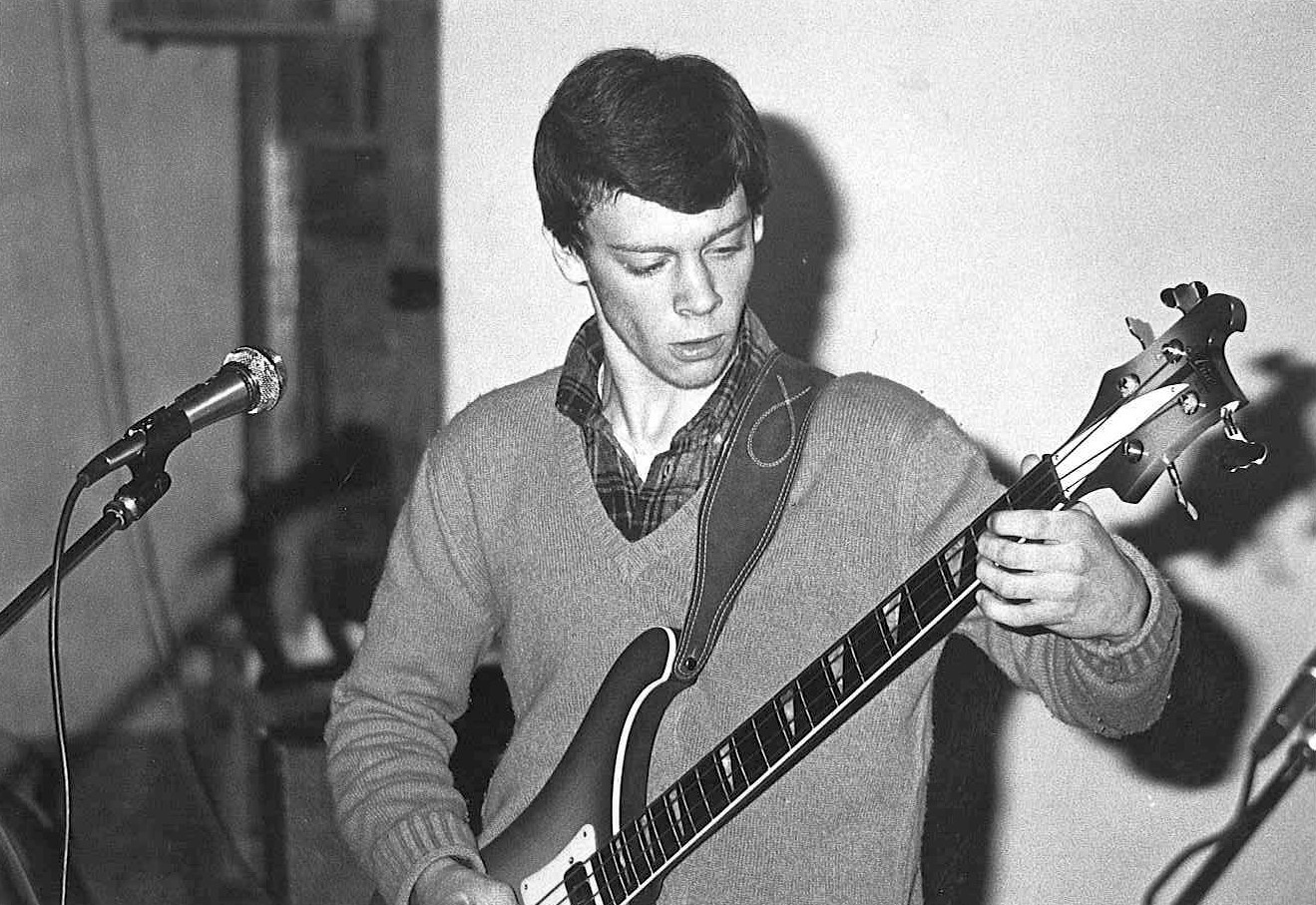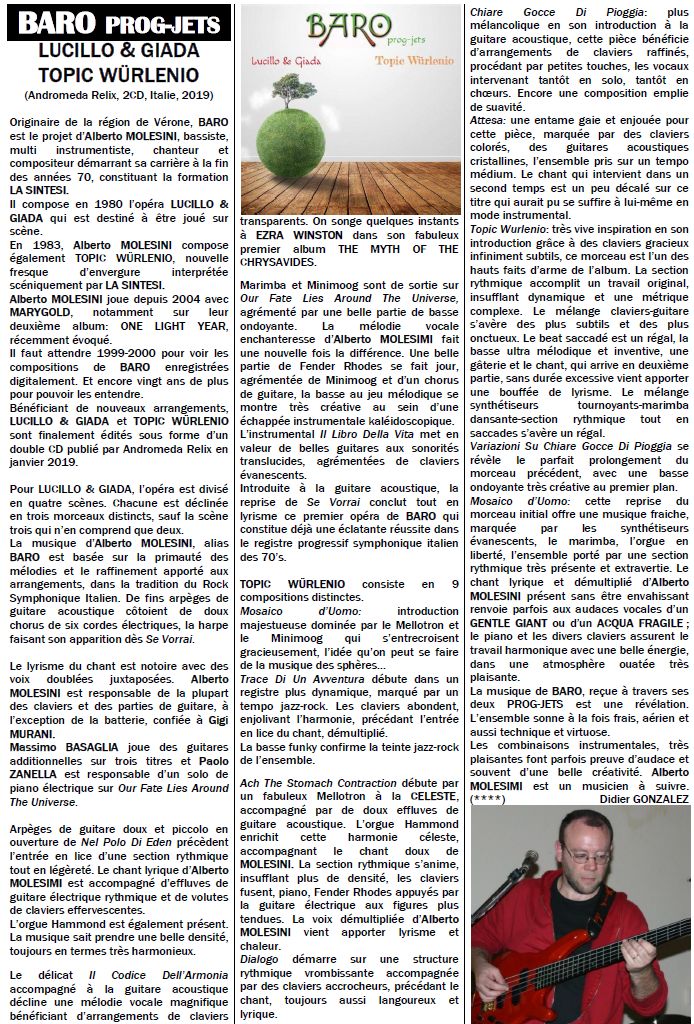
G.F.Cassatella su Raw & Wild
22/04/2019
RawAndWild.it
The story of Alberto Molesini of Marygold has its roots in the 70s, at the time of La Sintesi prog band. A couple of record projects - Lucillo & Giada and Topic Würlenio - conceived in the first half of the 80s, which have had little luck, are now being reproposed in a double CD marked Andromeda Relix. Under the pseudonym Baro, the Venetian label relaunches those songs in a new guise, the result of a rearrangement operation which, however, has not completely erased the 80s flavor of the two works. Because both discs, although clearly inspired by the sacred monsters of our national and international prog of the 70s, are influenced in some way by the influence of the neo-prog bands (not always very much loved by fans of progressive music) which were at the time the most popular.
Let's go with order. The first CD, Lucillo & Giada, between the two is the more canonically prog one, the atmospheres more explicitly refer to the Italic tradition of the genre, Le Orme and De De Lind are some of the names that came back to my mind during listening. The disc is structured in four different passages, which sanction the different phases of what we could call a training concept.
Topic Würlenio since its Area-like attack has convinced me more, compared to the previous disk it moves with greater ease and stylistic freedom, at the end it appears less scholastic and "remote-controlled". Both albums feature an impeccable recording that highlights the technical skills of the instrumentalists who accompany Baro on his journey back in time. In fact, these works require a remarkable expressive range, and only an impeccable execution can highlight the different moods of the two story textures. The complete package is remarkable as well as useful to bring back a couple of passages of the minor and more hidden history of the history of Italian rock music. For collectors and completists, who are not satisfied with the usual five or six major names.
Rating: 7.5/10
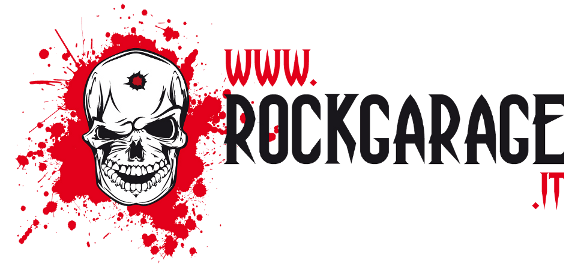
Raffaele Astore on RockGarage.it
31/03/2019
RockGarage.it
It's been a surprise to go back in time to a progressive that was but that, given the continuous productions we listen to or review, never sets down. And thank goodness because, when we talk about progressive, we mean qualitative and quantitative music given the amount of instruments necessary to produce it. Well, having said that, we come to this debut of the Baro Prog-jets which is really a great example of progressive seventies, or so, with atmospheres that recall great Italian bands with particular neighborhoods, for choirs, to the never forgotten New Trolls , but those of the primitive era. In reality what we have in the reader are two albums contained in one, that is to say a huge amount of work especially for us who are about to talk about it. And given the considerable amount of pieces present in this, let's call it a collection, don't make us struggle so much because to understand the true essence of all this production it is necessary to enrich your own disc collection going to buy the album.
But let's get back to the contents of this work: with this production Baro wanted to make room for compositions made over time, giving a new costume to the same ones that led to the creation of Lucillo & Giada, the first CD in custody. And it is here, in this first CD, that all progressive atmospheres branch out from classicism to the intersection of several instruments that have made this genre great, which varies between symphony and epic rhapsodies. It is not even a coincidence that the Lucillo & Giada CD, composed of eleven tracks, is divided into four scenes almost like a theatrical suite, or rather a musical one. Good work there is nothing to say! Baro, then, making use of great musicians, brings the composed music to unusual heights where some passages of Genesis are palpable with touches of acoustic guitar and a keyboard that is really intense. But Baro never forgets, even for a moment, what his musical roots are, that is the progressive tricolor made of great sounds and great voices that have as reference not only the New Trolls of the beginning but also the P.F.M. of American productions when, our progressive landed overseas. In short, a double CD that seems to have been made for us to divide the vintages, namely Lucillo & Giada aimed more at 70s rock, while with Topic Würlenio the era is that of the 80s, in short two decades divided into two distinguished CDs.
There is one more thing, however, in these two distinguished works that must be emphasized: if we want to listen to the glories of a past that often returns - for example Osanna, PFM, New Trolls or other, it is enough to listen to Lucillo & Giada and then Topic Würlenio to feel catapulted into the mid-70s and 80s. And it is no coincidence that this is so because the music of that era is more relevant than ever. It may be because when they gave it for him, the progressive we mean, he played a bad joke on many of those who considered him now on the way to sunset; already, because, rock has never died ... and even progressive. And thank goodness. Good listening to everyone.
Rating: 7/10
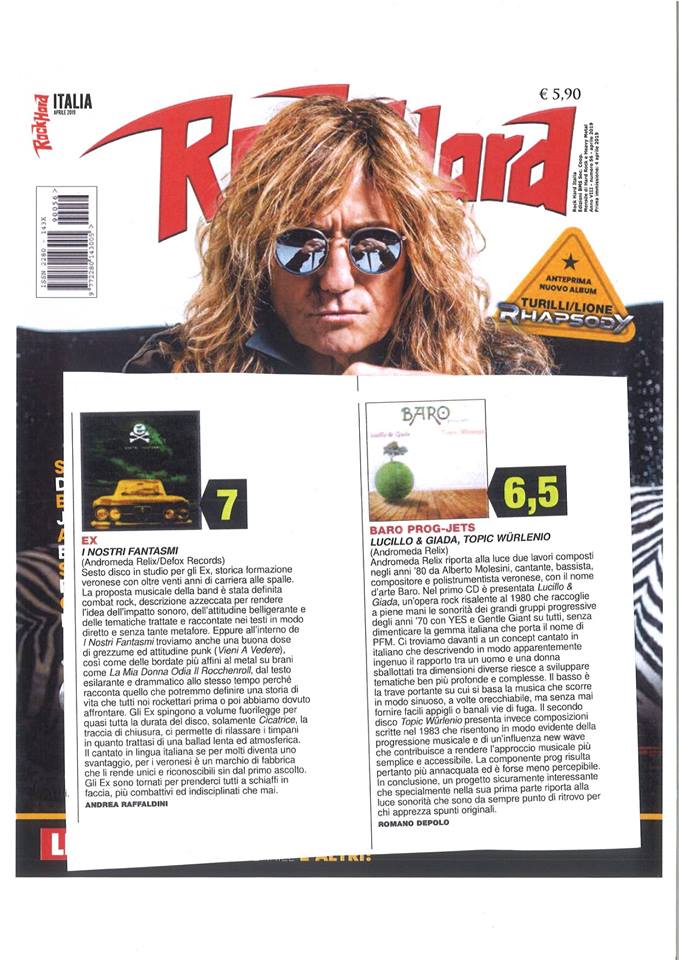
Romano Depolo on Rock Hard
April 2019
Andromeda Relix brings to light two works composed in the 1980s by Alberto Molesini, a Veronese bass player, composer and multi-instrumentalist with the art name Baro. In the first CD is presented Lucillo & Giada, a rock opera dating back to 1980 that fully collects the sounds of the great progressive bands of the 70s with YES and Gentle Giant above all, without forgetting the Italian gem bearing the name of PFM. We find ourselves in front of a concept sung in Italian that, by describing in an apparently naive way the relationship between a man and a woman tossed between different dimensions, manages to develop much deeper and more complex themes. Bass is the load-bearing beam on which the music that flows in a sinuous, sometimes catchy way is based, but without ever providing easy grips or banal escape routes.
The second disc Topic Würlenio instead presents compositions written in 1983 that are evidently affected by the musical progression and a new wave influence that contributes to making the musical approach more simple and accessible. The prog component is therefore more watered down and is perhaps less noticeable.
In conclusion, a certainly interesting project that - especially in its first part . brings to light sonorities that have always been a meeting place for those who appreciate original ideas.
Romano Depolo
Rating: 6,5

Valentino Butti on Arlequins.it
30/03/2019
Arlequins.it
Alberto Molesini, aka "Baro", a Veneto multi-instrumentalist, began to compose the two albums (that see the light only today, thanks to Andromeda Relix) about forty years ago, while still a teenager. In particular, the first version of "Lucillo & Giada" was developed at the turn of the 70s and 80s, when he was one of the members of the group "La Sintesi", while "Topic Würlenio" comes from the 1981/83 period. Both jobs had the primary function of "creating" a live set-list for the group. After further experiences, the last of which as a guest bassist for "Marygold" (nice their "One light year"), a series of combinations (the knowledge of Andromeda Relix managers, being mentioned in a book dedicated to progressive Italian) convince Molesini to take up the material composed in his youth. Here, then, is this double CD, published by Andromeda Relix in early 2019.
The first "Lucillo & Giada" is a fantapolitical concept album divided in 4 scenes as in a theatrical work (for 11 total songs and 44 minutes in duration) in which Molesini takes care of the guitars, keyboards and vocals. Guests of the album Gigi Murari on drums, Massimo Basaglia on guitars in some tracks, Paolo Zanella on piano (in a song) and Elena Cipriani on vocals (also in one song), that is the line-up of "La Sintesi" which proposed the work or at least a part of it on stage. It is superfluous to dwell on the individual pieces, it's better to consider the album as a whole as a single long piece: here is a refined symphonic prog, sung in Italian (except for a ... bilingual song ...), full of vocal mixtures (a bit like New Trolls), of notable melodic vivacity, with good instrumental passages closer to rock/new prog of the early 80s (years in which the concept was elaborated, let's not forget) than to the sonorities of the previous golden decade. If we were "forced" to choose a song that better than others is able to represent the project we would choose "Nel Polo di Eden", with a soft introduction entrusted to the acoustic guitar and the flute followed by an instrumental crescendo that anticipates singing. This is followed by a slightly heavier turn with the electric guitar in evidence alternating with the keyboards and then, to close, songs and airy counter-melodies. Overall a pleasant job, at times naive, but with good ideas not always fully completed ... but it was a very very young Molesini.
Of a completely different "weight" is "Topic Würlenio", subdivided into 9 tracks that, although unrelated to each other, have as their corollary the track 1 and the track 9 with the same title "Mosaico d'Uomo Intro" and ... "Mosaico d'Uomo" (divided into three sections). Emphatic and brief introduction of keyboards the first, brilliant, but with a bit "cold" sounds the second. Wide space entrusted to the choirs, always pleasant, which refer to New Trolls and to Castello di Atlas. That of "cold" sounds is a bit the sign of the times, the early 80s, so we are not surprised that much in face of certain sounds, as in the pleasant "Tracce di un'Avventura", with bass in foreground and sparkling piano and keyboards. "Ach the Stomach Contraction", introduced by spanish guitar, is another successful piece, with remarkable bass lines, interesting instrumental passages, while sung parts lack a little. The attempt to combine easy vocal listening with more complex musical structures is the common thread of the other songs and the result is not always convincing: insipid "Attesa" and too dull "Chiare Gocce di Pioggia". The title track turns out to be one of the most interesting tracks with really nice articulated plots.
A work, this "Topic Würlenio", with lights and shadows. The "lights" are the melodic ease that pervades Molesini's compositions, from the simplest to the most elaborate. The "shadows" are the aforementioned used sounds that, paradoxically, appear more dated than the "vintage" 70s and also a certain repetitiveness of the singing solutions. Now let's see what Molesini/Baro will want to do "when he grows up", whether to re-open the youth drawers once again or to dedicate himself to brand new music.
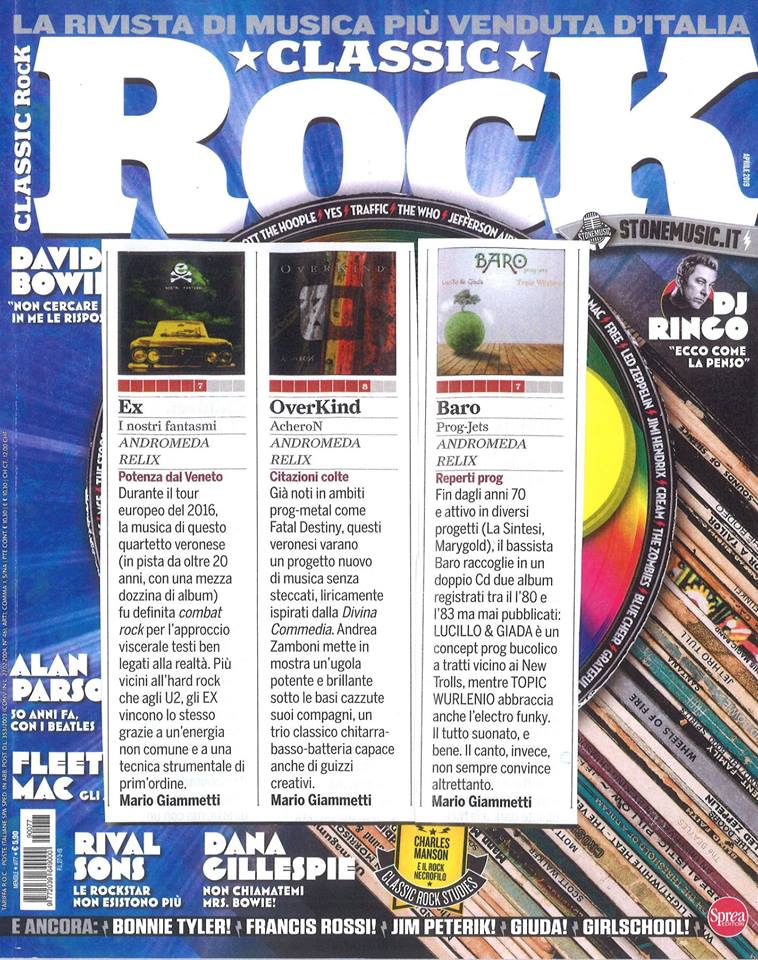
Mario Giammetti on Classic Rock magazine
Marzo 2019
Prog relics
Since the 70s and active in several projects (La Sintesi, Marygold), bassist Baro has collected two albums recorded between 80 and 83 but never published in a double CD. LUCILLO & GIADA is a bucolic prog concept close to New Trolls, while TOPIC WURLENIO also embraces electro funky.
All played, and well. Singing, on the other hand, does not always convince as much.
Mario Giammetti

Enrico Burzum Pauletto on MetalHead.it
04/03/2019
MetalHead.it
A double prog album... and not metal prog, just the 80s progressive, that already at least a decade before had put Italy right in the second place of the world music scene; only because the first place was occupied by a certain English group ...
Music of the 80s, we were saying. Baro, the pseudonym of Alberto Molesini, has always been good or bad in the tricolor scene, so from his archives he decided to brush up and re-arrange two old albums released just in the early 80s.
"Lucillo & Giada" is a mammoth concept divided into 4 acts (but here subdivided further to increase the practicality of listening), really ambitious and compelling. The sounds have not been changed very much for what concerns the progressive atmosphere, an exquisitely tricolored prerogative. It's like listening to the sound of a vintage car brought to light and arranged with modern technology. Sung in Italian, offers a glimpse of how music was in the peninsula almost forty years ago: transcendental and never banal lyrics, emotional music that digs furrows in human soul, unique atmosphere and complete freedom and dedication to experimentation.
The second CD is more canonical, perhaps even less prog and more stylistically free from the canons, more usable - but maybe gives less time to emotions than the previous work.
The instruments are played with such perfection that it is in fact useless to spend so much time, here are people who play so much that I was not even born when they started, so it seems unfair to dwell on the point.
Instead I would like to say that the work (re)exposed here is really an inseparable cross-section for prog lovers, both those involved in the work and not, recorded and repurposed in splendid form. Almost a brand new job...
Rating: 8/10

Dazagthot on MetalEyes.Iyezine
04/03/2019
MetalEyes.iyezine.com
FOR THOSE WHO LOVE THE MOST CLASSIC PROG, CONTAMINATED OF ATMOSPHERES FROM THE 80S. THE OPPORTUNITY TO FOLLOW THE FIRST STEPS OF AN EXCELLENT ARTIST.
REVIEW 8.5
Baro is Alberto Molesini stage name. A bassist, singer, songwriter and multi-instrumentalist who, in the late seventies, founded La Sintesi: an interesting attempt to combine the English prog tradition (Yes and King Crimson in the first place) and the Italian symphonic orchestral pop of PFM and Orme.
In 1980, in order to feed the group's live repertoire, the concept in several acts Lucillo e Giada was realized, a sort of ambitious rock opera. Three years later it was the turn of Topic Wurlenio, another collection of songs to be proposed live in concert. For prog rock, you remember, 80s were not easy years, neither from us, nor abroad. After appearing on a Radio Studio 94 compilation, the project went into stand-by. Molesini, during the nineties, cooperated with Hydra and Elam pop-metal duo. In the new millennium, with the help of new technologies, then Utopie came out. Since 2004 Molesini has played with Marygold, an excellent progressive band of our house, responsible for the excellent One Light Year album (2017).
However, Alberto's desire to realize the youth projects should never have been extinguished: here is explained Baro Prog-jets, a work of respectful recovery of the period 1980-83, with new contributions and arrangements. We can now listen to those first two works by Baro: a traditional rock prog, full of ideas and original hints. Many musical themes are intertwined in Lucillo e Giada. Topic Wurlenio was written in the middle of the new wave era and rightly preserves its influences, a bit in the first Twelfth Night style.
Ultimately, two beautiful works, which now finally see the light on double CD, not without references to BMS and Osanna.
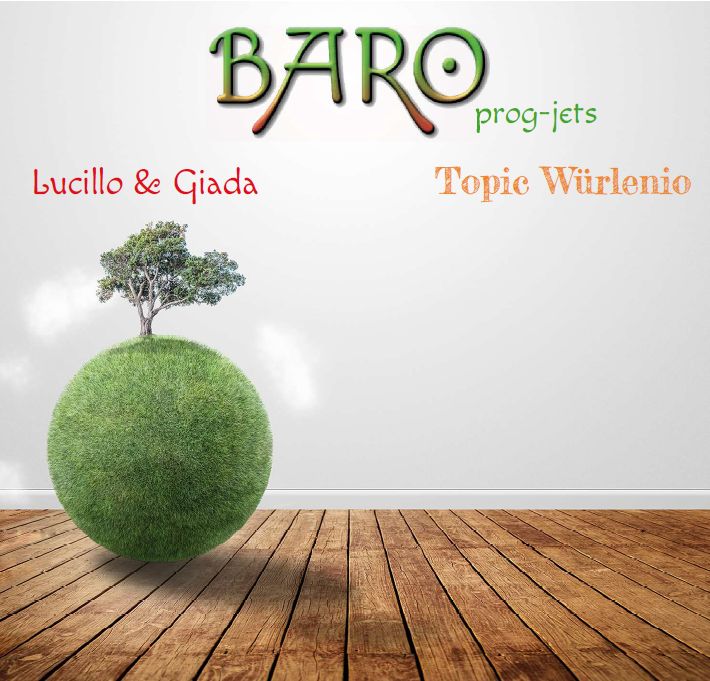
Max Salari: first review of Lucillo & Giada-Topic Würlenio
24/02/2019
NON SOLOPROGROCK.BLOGSPOT.COM
Andromeda Relix label often focuses on works that over time have not had the right considerations for any reason, if not even lacked record release. A meticulous and courageous research that very often amazes in the result. It happens that some groups come out with a job at the wrong time, for example debut with the Progressive Rock in the early 80s is at least penalizing since the genre at the end of the '70 "pulls the oars on the boat". But if something is valid it is always, regardless of the year or the fashions.
Having said that, let's enter the world of Alberto Molesini in art Baro, bassist and multi-instrumentalist, singer and composer. In the late '70s he's been part of La Sintesi rock band, musicians who admired bands like King Crimson and Yes for the sounds. Since 2004 he has been playing and writing with the band Marygold, authors of the excellent "One Light Year" of 2017.
Over time Baro feels the need to be able to give voice to those works of youth that have seen little light, excluding a song from 1983 "Topic Würlenio" published on vinyl on a compilation of Radio Studio 94. A new look, re-arranged, to start from the first CD called "Lucillo & Giada", Rock opera of 1980. It is a single forty-four minute song divided into four scenes, a concept that speaks of fantapolitica with ideas also autobiographical.
Here are all the requirements that make Progressive Rock a genre sometimes symphonic and epic, with related changes in mood and time. I can capture some vocal passages dear to our own groups like I Giganti of "Terra In Bocca" or the New Trolls, and a basic motif that prints itself immediately in the head, because Baro music is highly catchy and effective. Along the disc, the artist makes use of the collaboration of special guests who respond to the name of Massimo Basaglia (guitar), Gigi Murari (drums), Paolo Zanella (keyboards) and Elena Cipriani (voice).
The suite "Lucillo & Giada" is a great pindaric flight, bread for the most hardcore Prog fans; the '70s are the prerogative, but also the fact that the' 80s have arrived, so New Prog is hatching and some prototype of passage it is warned. Obviously there is no shortage (especially in some guitars) the steps to the Genesis, inevitable masters of the symphonic genre in question.
It will also be a work of youth, but I personally feel a lot of material inside and I am largely satisfied and impressed by it.
Coming to "Topic Würlenio" the most striking thing is the fact that the 80s have arrived in full, the sound is spy. The disc is divided into nine tracks. The intro of keyboards entitled "Mosaico D'Uomo" raises the listener of epic and redundant sounds leading him to "Traces Of An Adventure". The bass plays, as always, in Baro's music an almost central role, skipping riffs and melodies with a warm and full sound. The instrumental parts are always of great effect and highlight the compositional skills of Molesini. Amazing fugues as in "Ach The Stomach Contraction". Good arrangements, music with attention to detail, sounds that act as a counterpoint to the main refrain complete the sound in an important way.
Baro also plays with grace on certain instrumental passages, with respect to the melodies and good ideas, listen to "Chiare Gocce Di Pioggia" to believe.
Excellent the title track "Topic Würlenio", so the conclusive "Mosaico D'Uomo".
Nice in the cd cover strip a phrase recalling the Beatles (intentionally or not, I do not know) "Baro ... With A Great Help From His Friends".
So this double work by Baro is able to bestow many emotions, dear to this music's connoisseurs. Give it a chance and you will not regret it. MS
